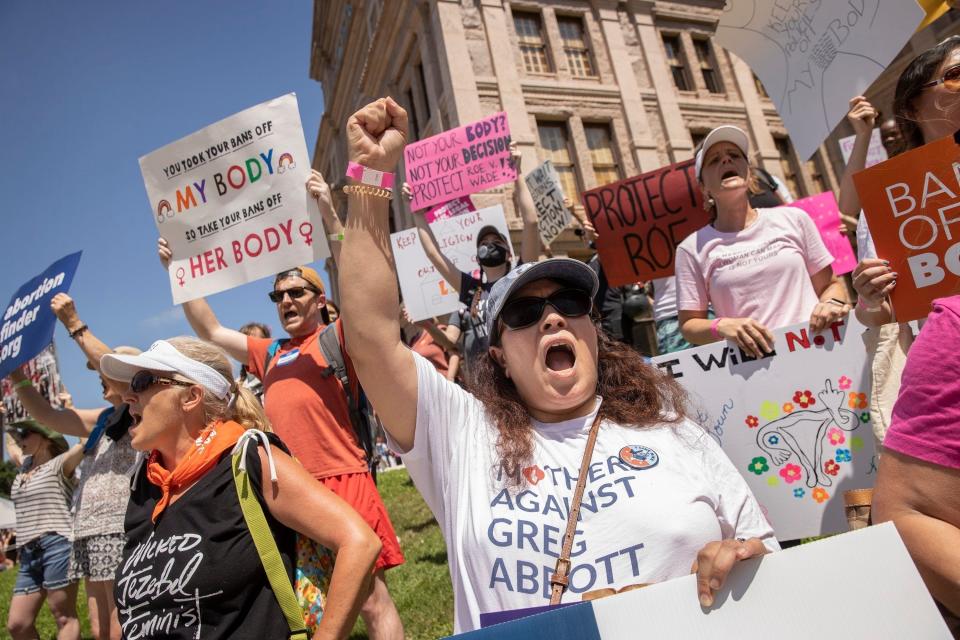Overturning Roe v. Wade was devastating. I'm a doctor and I'm worried about what's next.
Two years ago, when I learned that the Supreme Court overturned Roe v. Wade and eliminated the right to safe and legal abortion, my heart sank. I was devastated. In an instant, I went from providing essential healthcare to people in need, to looking at empty exam and waiting rooms.
Patients have suffered devastating health complications as a result of not receiving timely care. I’ve seen my colleagues, bound by new and confusing abortion restrictions, forced to send patients home to get sicker before being able to provide treatment. I’ve seen lives upended, patients pushed to the brink, and doctors with years of training and education forced to defer to ideological lawmakers with no medical background.

Here in Texas, where abortion rights have been under attack for decades, the impact of Dobbs has been particularly painful. In 2021, the night before S.B. 8, Texas’ six-week abortion ban, took effect, the clinic was open late to treat as many patients as possible before we had to start turning dozens of patients away.
Over the next few months, I developed the skills to be able to tell desperate patients, without crying, that we could not help them, simply because they were one or two days beyond a scientifically meaningless cut-off and could not legally receive care. As someone who took an oath to do no harm, this was heart-wrenching. After the Dobbs ruling, patients stopped showing up completely. That doesn’t mean that people in Texas suddenly stopped needing abortion care – it means they were forced to travel out-of-state, self-manage their abortions, or to carry their pregnancies to term.
Anti-abortion activists and lawmakers are quick to defend the “medical exceptions” in abortion bans like S.B. 8, which they say protect patients in need of emergency care. In fact, the opposite is true. These “exceptions” only undermine medical judgment, create confusion for patients, and delay access to care. In no other circumstances are we asked to pause necessary and life-saving treatment to seek legal counsel or send patients home to get sicker before providing what we know to be the right care. It’s our job to act swiftly and provide appropriate, timely, and morally responsible care to patients in need. The Supreme Court’s Dobbs ruling has made this increasingly hard to do, and patients' lives have been put at risk.
Unfortunately, overturning Roe v. Wade was not the end, and attacks on reproductive freedom have escalated over the past two years.
This term, the Supreme Court evaluated two cases that could further restrict access to reproductive health care in Texas and across the country. In FDA v. Alliance for Hippocratic Medicine, a cobbled together anti-abortion group, went after access to medication abortion, despite the fact that studies have shown time and time again that medication abortion is safe and effective. In addition, more than 7 in 10 Americans support access to medication abortion, including half of Republicans. Thankfully, the Court unanimously decided that the Alliance for Hippocratic Medicine did not have standing to sue, and access to medication abortion, for the present, remains unchanged.
In Idaho and Moyle, et al. v. United States, anti-abortion extremists are asking the Court to gut the Emergency Medical Treatment and Active Labor Act (EMTALA), which protects the right to emergency medical care, including abortion. If the Court sides with the plaintiffs, we will see patients too sick and too unstable to flee the state. People will die. Most Americans overwhelmingly agree this law should be upheld and protected, and that the decision to have a life-saving abortion should be between a patient and their doctor, not decided by judges or lawmakers.
The two years since we lost the federal right to an abortion have not lessened the devastation I felt then, and I'm even more outraged today. Roe was not the first domino to fall but maybe the loudest. Anti-abortion extremists won’t stop until abortion is banned nationwide. Now more than ever, we must amplify the stories of people affected by the tsunami of abortion bans and restrictions following Dobbs, to stop further attacks on our freedoms.
Dr. Beasley is an obstetrician-gynecologist based in Houston. She currently serves as the Medical Director of Planned Parenthood Gulf Coast.
This article originally appeared on Austin American-Statesman: Overturning Roe v. Wade was devastating. I'm worried about what's next

